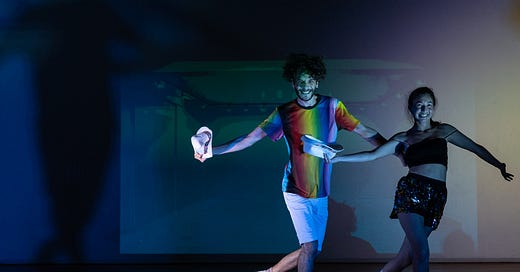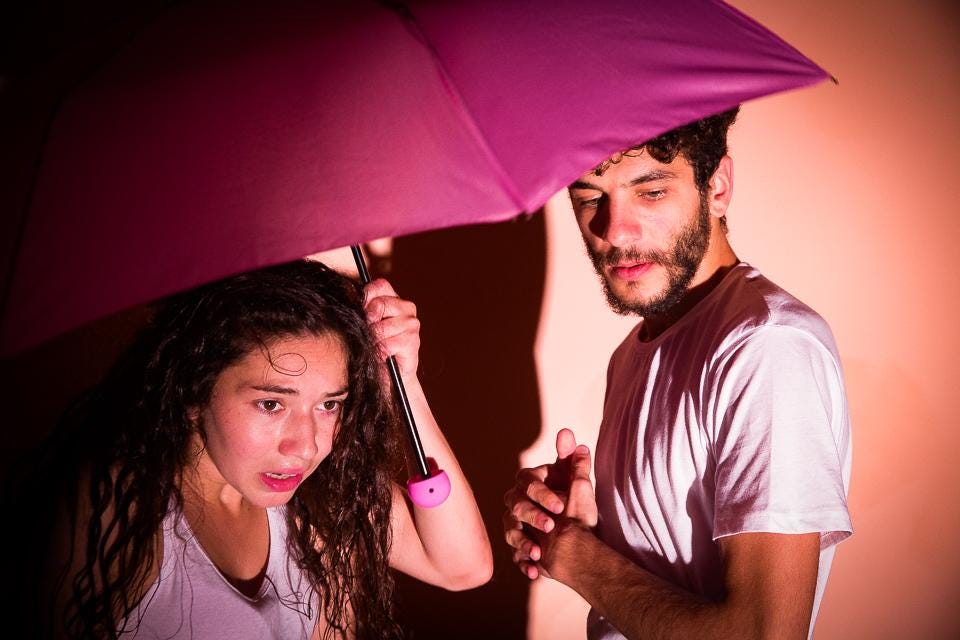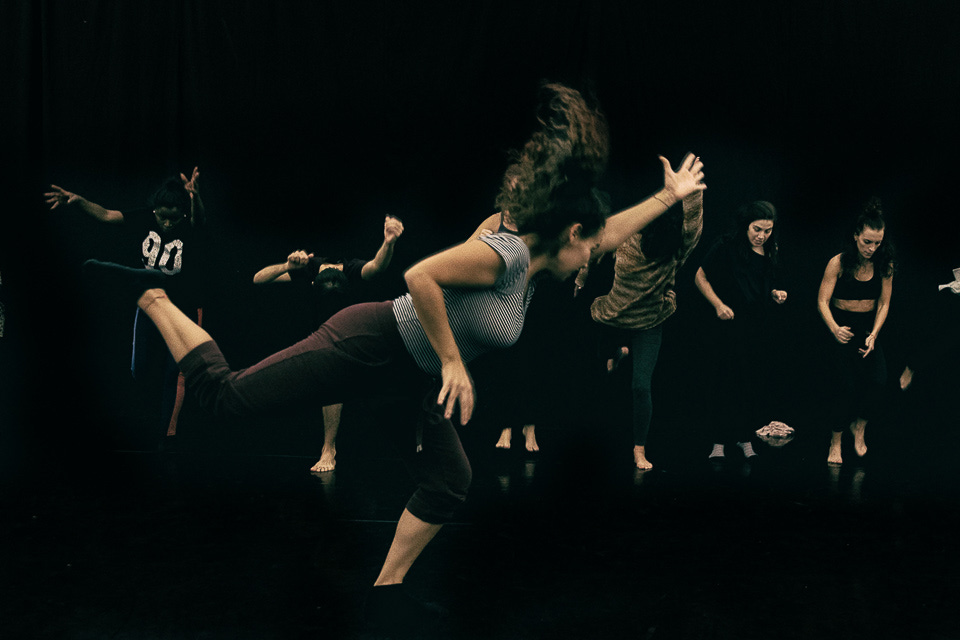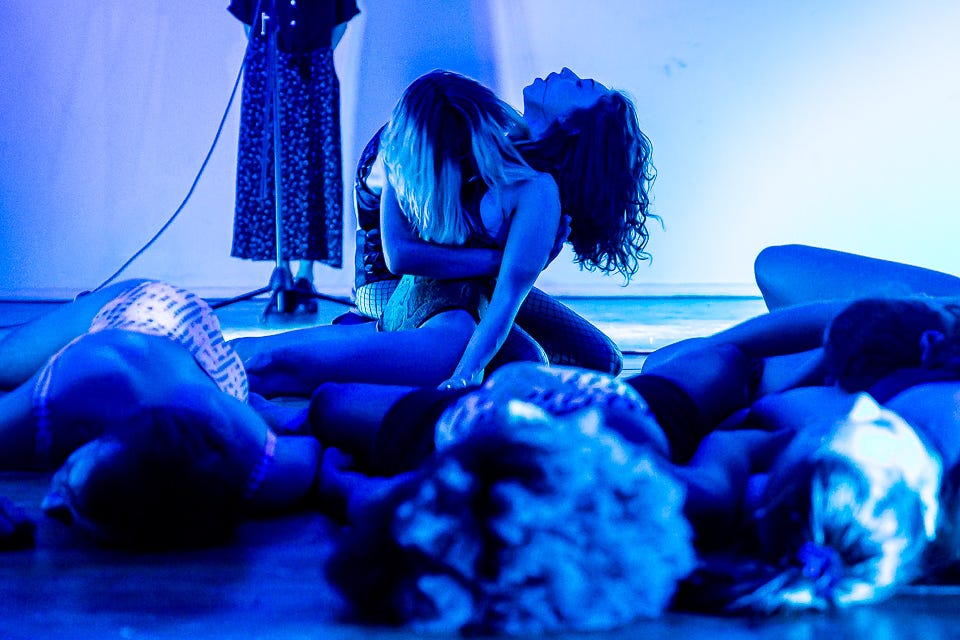Let's get meta: The cinematic universe of Mário Coelho
On a young Portuguese director making layered, unpredictable shows rich with pop cultural reference.
Welcome to Café Europa, a weekly newsletter dedicated to European theatre.
Earlier this week the annual The Stage Awards took place at Theatre Royal Drury Lane in London. This year’s International Award went to Battersea Arts Centre for the way they’ve been internationalising their programme, bringing artists including Miet Warlop, Milo Rau and Florentina Holzinger to the UK, and arguably becoming one of the key centres for international work in London. Here’s my interview from earlier last year with Pelin Basaran, Battersea Arts Centre’s Head of Programming, on how she’s gone about achieving this.
This week’s newsletter has a Portuguese focus with a look at a young theatre maker creating playful, shape-shifting work.
A woman is making a declaration of love to the man standing opposite her. It takes me a while to realise that the words she’s speaking are not her words but those of Harry in the iconic New Year’s Eve scene in When Harry Met Sally. (“When you realize you want to spend the rest of your life with somebody, you want the rest of your life to start as soon as possible.”) As she is speaking, a clip of Jack Nicholson in The Shining plays on a loop in the background. It’s a delicious juxtaposition, and in its witty cine-literate way, typical of Mário Coelho’s giddily inventive show I’m Still Excited.
This is not the easiest of shows to categorise. Just when you think you have a handle on what it’s doing, it morphs into something else. I’m Still Excited is essentially a story about the breakdown of a relationship, but it’s also about how we tell stories about relationships, the tropes, the cliches, the expectations we place on ourselves.
It opens with actor Rita Rocha Silva explaining to the audience that we’re at a party for her friend Mario. She wants us to get in a party mood. She also explains that the piece we are about to see is based on Mario and Rita’s real-life relationship as well as being a response to an earlier piece by Coelho, I’m So Excited, which they also performed together. The show is a real shape-shifter; entertainingly unpredictable, it keeps its audience on their toes. One moment the pair are engaged in a vigorous dance-off to Jenifer Hudson’s ‘And I Am Telling You I’m Not Going complete with what is best described as a pants-down death drop, the next they are unpacking the tropes of romantic comedies that Hollywood foists on us, and the narrative that ‘the one’ is waiting out there for all of us.
The show has a DIY vibe with the performers moving the lights around themselves and Mario using his laptop to cue up videos and the occasional dick pic. It’s exciting to watch, and very, very funny. Then, roughly half-way through it flips things completely. Two more actors - Anabela Ribeiro and Pedro Baptista - arrive on stage. We are told that they are going to star in a film about Mario and Rita’s relationship. The audition process involves recreating the classic dash-to-airport scene and other staples of romantic cinema. A wind machine is deployed. the performance comes to feel emotionally uneasy and messy. Rita and Mario attempt to recreate their first encounter, to go back to the very beginning, but increasingly Rita appears unhappy with being put on the spot like this, with having to re-enact this for an audience. The pair of them start to argue and the argument is as raw as it is relentless. They lay into each other verbally, unravelling each other’s flaws, every drip of bitterness and resentment bubbling to the surface as the two other actors look on awkwardly.
When I saw the piece at Dresden’s Fast Forward festival, I remember wondering about the fact that this piece, in which Rita is framed as the narrator, is written and directed by Mario, especially if this was based on a real relationship. It threw up all manner of fascinating questions about agency, power and consent in the creative process. However, this unease and ambiguity is part of what makes it great. The relationship is just another layer of fiction in this mille-feuille of a production. It’s an incredibly self-aware and self-interrogative show - at one point the performance administers the Bechdel test on itself and even the surtitles, created for the benefit of the international audience, eventually become sentient.
“I love playing with the audience’s expectations” - an interview with Mário Coelho
“There’s a lot of meta stuff going on in that show,” says Mário Coelho, which is something of an understatement. He describes his work as matryoshka-like, resembling a Russian nesting doll. Having previously collaborated with Rita Rocha Silva on I’m So Excited in 2018, a show about the relationship between two people called Mario and Rita, he felt the need to revisit the piece. The original show was very focused on the male experience, and he wanted to shift the focus onto the woman. “It was so much about the man, and I wanted to critique that.” The result was I’m Still Excited.
He and Rita, he explains, have never had a relationship in real life, but they are friends and collaborators. While he defines himself as queer, his first relationship was with a woman. During that time, he was aware he was always trying to perform the stereotypical role of a man in society. “I had this male toxicity inside of me. I didn't know that I had it at the time, but I think we all have it, and we need to get rid of it.”
With the first show, he was very much the author, and she was the actor, the roles were clearly defined, whereas with I’m Still Excited he considers Rita a co-author and she was consulted throughput the creative process.
Coelho’s work is steeped in cinematic reference. He initially wanted to be a film director but ended up studying theatre in Lisbon. Her remains interested in the ways in which theatre and cinema connect. He’s particularly fond of genre cinema, of old musicals and horror films. “I love twists and turns. I love playing with the audience’s expectations.”
After graduating, Coelho started making work in apartments and fringe theatres with limited financial resources. His 2018 show É Difícil para Mim Dançar! (It’s Hard for Me to Dance) is his response to The Cherry Orchard. In Chekhov’s play the characters are not proactive, he says. “They never do anything. And I thought what if I did a version of the text where instead of all this passivity that permeates the characters, they really try to keep their house, they really fight for it.” He decided to fuse Chekov’s play with They Shoot Horses Don’t They?, Horace McCoy’s 1935 novel about the gruelling dance marathons of the Great Depression. The result was an intensely physical production that the nearly all female cast. He most often works with female performers and is more drawn to female-led stories, partly he thinks, because his father was something of an absent figure during his childhood and he grew up mostly with women. “All my life, I have always been surrounded by great and amazing women. The way that I see the world is shaped by these women.”
His (spectacularly-titled) 2020 show Fuck Me Gently! is another very meta piece. It’s set in 2030, in a time when theatre is no more theatre. Two young brothers announce they are casting for a new play and the audience is then presented with a series of auditions. Like all his work, it is a creation of layers. at once a commentary on theatre and a meditation on loss.
His most recent show, Se te portares bem, vamos ao McDonald’s! (If you Behave, We’ll Go to McDonalds!), his first to be co-produced by Teatro do Bairro Alto, was a horror-inflected melodrama about a company that provides human substitutes. A woman is hired to spend a week with a family after their eight-year-old daughter dies from leukaemia. The result, he says, is a little bit Black Mirror, he says, though he also takes inspiration from Yorgos Lanthimos, Wes Craven, John Carpenter and Julia Ducournau. It is once again a play that evolves, drawing on Coelho’s own memories of losing his mother when he was eight.
“I still remember the feeling of going to the window and seeing the world still moving, like nothing had happened, like it was a normal day for everyone, while for me, it was almost like the end of my world. For the rest of these people, maybe this day will not be important at all. I always felt like this was something violent. What if this loss of someone could represent like the end of the world, the end of everything.” In this way, by the time the play is over, it has become a story of apocalypse.
Working as an independent theatre artist in Portugal is not without its challenges. Sustaining a career is hard. “I am a privileged person,” he stresses, because he has had the opportunity to work within institutions, with the resultant better working conditions, “but for people starting out now, it's so difficult because I don't know where you get the funding. I don't know where you get the places to support you.”
There is cultural funding in Portugal but not enough to go around. Space is also an issue, with former performance spaces being turned into hotels and apartments. Even when you successfully create a piece, it has a limited run. Not only is it frustrating to pour so much time and energy into creating a piece only for it to be seen for a handful of nights, the work also doesn’t have the opportunity to develop. I’m Still Excited is the exception that proves the rule. They’ve been performing it since 2021 and it has had the opportunity to grow. When he considers what the show was in the beginning with what it is now, “we are more confident, and the piece is more complex.” The show is also still developing. The subtitles which gradually become sentient was a new addition for the performance in Dresden.
One of the problems is that people take on too many projects because they need to pay their rent. “There is always a lot of stuff happening, but nothing really sticks,” he says. “What if there were the fundings for projects to develop over two years or more?”
“We really need to stick together as artists,” he says. “We really need to support each other.” It’s important to speak up for each other, to find ways of helping one another to improve working conditions. “If we all did this, I think things will start to change. If we started saying ‘no, I'm not working in these conditions,’ things would need to change.”
This week in European theatre
A round-up of festivals, premieres and other exciting upcoming events over the next seven days
Manipulate Festival – The international festival of puppetry, visual theatre and animation takes place at venues across Edinburgh. Highlights of the 2024 programme include Tortoise in a Nutshell’s Ragnarok – for more on this check out the most recent edition of Fergus Morgan’s The Crush Bar - work from France’s Compagnie Bakélite and Tess, Ockham’s Razor’s circus version of Thomas Hardy’s Tess of the D'Urbervilles. The festival runs from 1st-11th February.
#Motherfuckinghood – Berliner Ensemble member Claude De Demo joins forces with director Jorinde Dröse for a show about the experience of being a mother in a capitalist society, invisible labour it requires and what it means to be caregiver. It premieres in Berlin on 1st February.
An Enemy of the People - Matt Smith and Jessica Brown Findlay star in this new English language version of Thomas Ostermeier’s Schaubühne production of Ibsen’s play, which opens in London’s West End a decade after the original German version played the Barbican in 2014. It begins previews on 6th before opening officially on 20th February.
Thank you for reading! If you enjoyed this newsletter, then please consider sharing it or, if you or your institution are able to do so, joining the growing number of paid supporters. The newsletter is a pleasure to write, but it is a lot of work and your support makes a difference. This year, as promised there will be more bonus editions for paid subscribers. I have some exciting things lined up. You can contact me on natasha.tripney@gmail.com







